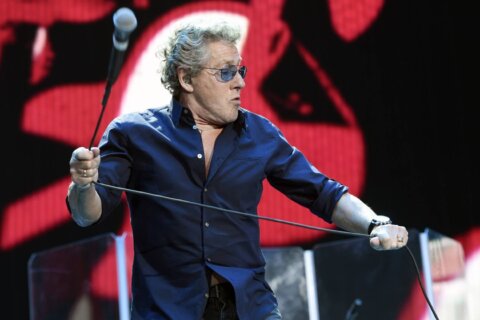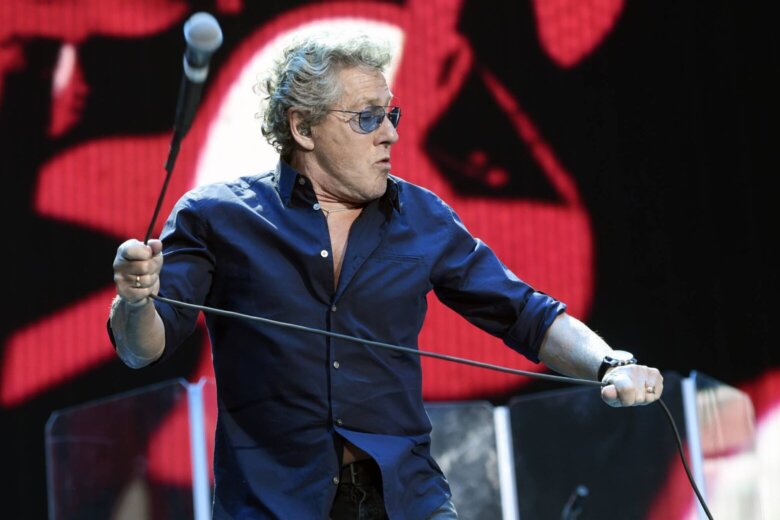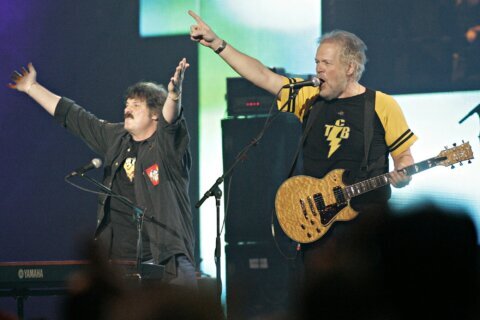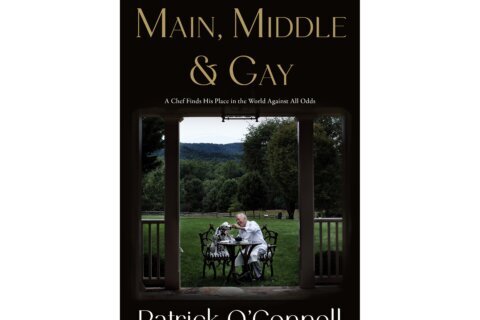Northern Virginia is about to be invaded by a true rock legend of the 1960s British Invasion!

Roger Daltrey, lead singer of The Who, performs live at Wolf Trap on Wednesday, June 12, with a touring band that includes Pete Townshend’s younger brother Simon Townshend.
“It’s just a different instrumentation,” Daltrey told WTOP. “I do some Who songs, a lot of the classics, but I do them differently. Now with the instrumentation I’ve got in this band, it’s just fresher. I suddenly realize that what people want in the moment with so much bad news out there everywhere in the world … people want to go out and have a good night out.”
Born in 1944, Daltrey grew up in postwar London, making his own instruments from nearby objects and attending grammar school with future Who guitarist Pete Townshend and future Who bassist John Entwistle.
“They were at the same school, but they were a year younger,” Daltrey said.
“You couldn’t miss them. Pete was like a nose on a stick and John had a kind of John Wayne gait when he walked. … Pete, because he did look extraordinary when he was younger, I’m sure he was bullied as much as I was. I was very small, so I got bullied. I don’t know if John did, but John had trauma in his life when his mother and father got divorced very young.”
Their band, The Detours, later added drummer Keith Moon to form The Who in 1964.
“He heard we were looking for a drummer and we gave him a chance to play with us,” Daltrey said.
“You have to remember, the lead singer of a band doesn’t see them ever, they’re always behind him, he’s standing out in front in the middle of the stage … but you feel the vibe, you feel the micro-syncopations between musicians. When Keith Moon joined, it was like alchemy. Someone had added something to the mercury and turned it into gold.”
Their first album “My Generation” (1965) delivered a hit title track that defined a generation at Woodstock.
“We hit a nerve,” Daltrey said. “There’s a certain amount of luck, there’s a certain amount of talent, and there’s a certain amount of being in the right place at the right time — and we just seemed to get lucky.”
After a string of catchy hits like “I Can See For Miles” (1967) and “Magic Bus” (1968), The Who delivered an epic fourth project with “Tommy” (1969), a pioneering concept album telling the tale of fictional Tommy Walker becoming a spiritual leader. The tune “Pinball Wizard” echoed in arcades with the line “sure plays a mean pinball.”
“It wasn’t really a rock opera — we were kind of tongue-in-cheek having a dig at grand opera, but having played ‘Tommy’ live and with orchestras around the world, it’s my conclusion that I think ‘Tommy’ is the best opera ever written,” Daltrey said.
“It’s certainly got the best lyrics because we’ve at least got some lyrics. You needn’t know about grand opera to know about the lack of lyrics.”
Their fifth album “Who’s Next?” (1971) may have been their most famous, including the hit opening track “Baba O’Riley,” with its iconic synthesizer, shredding guitar and recurring vocal refrain of “teenage wasteland.”
“You never know where [Pete] gets those titles from,” Daltrey said. “He actually wrote the song basically reflecting on the garbage and the rubbish left by the audience at Woodstock!”
The album also included “Won’t Get Fooled Again,” which arrived during the Vietnam War and just before Watergate.
“We were commenting on politics, it’s never any different, they’re all full of sh*t,” Daltrey said. “That song will never date. The lyrics of that song will never, ever date. They’re always promising more than they can deliver.”
It also included the quotably melancholic “Behind Blue Eyes,” later covered by Limp Bizkit.
“You’ll have to really talk to Pete because he wrote those songs. I only know that my inspiration singing it was that it was a very sad time for me because my dog had just been run over,” Daltrey said.
In 1973, The Who returned to the concept album with Townshend penning the acclaimed “Quadrophenia.”
“I’ve always been a little frustrated that he never shared his vision of what that album was going to be,” Daltrey said.
“I’ve always felt that it’s probably three or four songs short of being a really, really good, I don’t know if you’d call it an opera, but something very new and driving. A musical as such. A good work on a bigger stage than just rock. It’s hard to get a dramatic drive on ‘Quadrophenia’ because, in some ways, it keeps shooting itself in the foot.”
Sadly, the band’s eighth album “Who Are You?” (1978) would be their final one with Moon, who died that same year. While its title track later became the TV theme for “CSI,” it mostly brings back sad memories for Daltrey.
“It was a really difficult album to make because of the state of Keith’s health at the time,” Daltrey said. “It was very difficult, so it’s not a happy memory, that one. That doesn’t make it a bad album, but it was just difficult.”
The band continued without Moon on their ninth album “Face Dances” (1981) with the hit “You Better You Bet.”
“We’d lost a huge piece of chemistry from the band in the way Keith played, and we were trying desperately to see what was left,” Daltrey said.
“There was some good stuff on that album, but it wasn’t The Who. … I think ‘You Better You Bet’ was a great song, but generally a lot of those songs weren’t The Who that the public wanted. Keith had left a bigger hole than just losing a drummer. We were broken at the time we made that album.”
In 1990, The Who was inducted into the Rock & Roll Hall of Fame, but Daltrey doesn’t spend time comparing his band’s legacy to The Beatles, Rolling Stones and Led Zeppelin on the Mount Rushmore of the British Invasion.
“I don’t give a f*ck, that’s not important to me at all, who gives a sh*t?” Daltrey said. “I think what we did, more than anyone else, is that we changed it from being ‘rock ‘n’ roll’ to begin just ‘rock.’ The Stones were a rock ‘n’ roll band, ‘rock ‘n’ roll, rock ‘n’ roll,’ but we were just rock: ‘rock, rock, rock, rock.'”
Listen to our full conversation on the podcast below:
Get breaking news and daily headlines delivered to your email inbox by signing up here.
© 2024 WTOP. All Rights Reserved. This website is not intended for users located within the European Economic Area.









